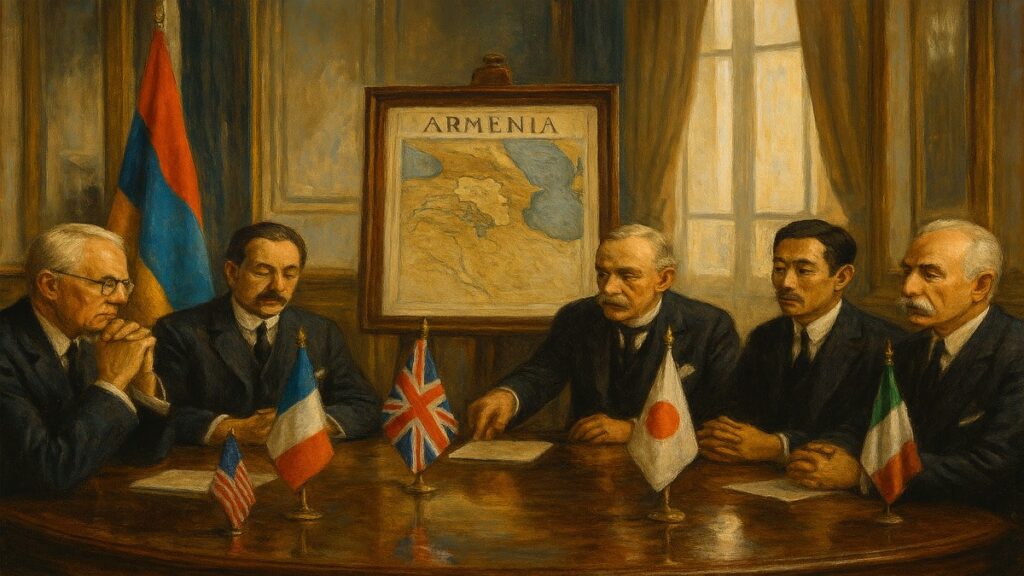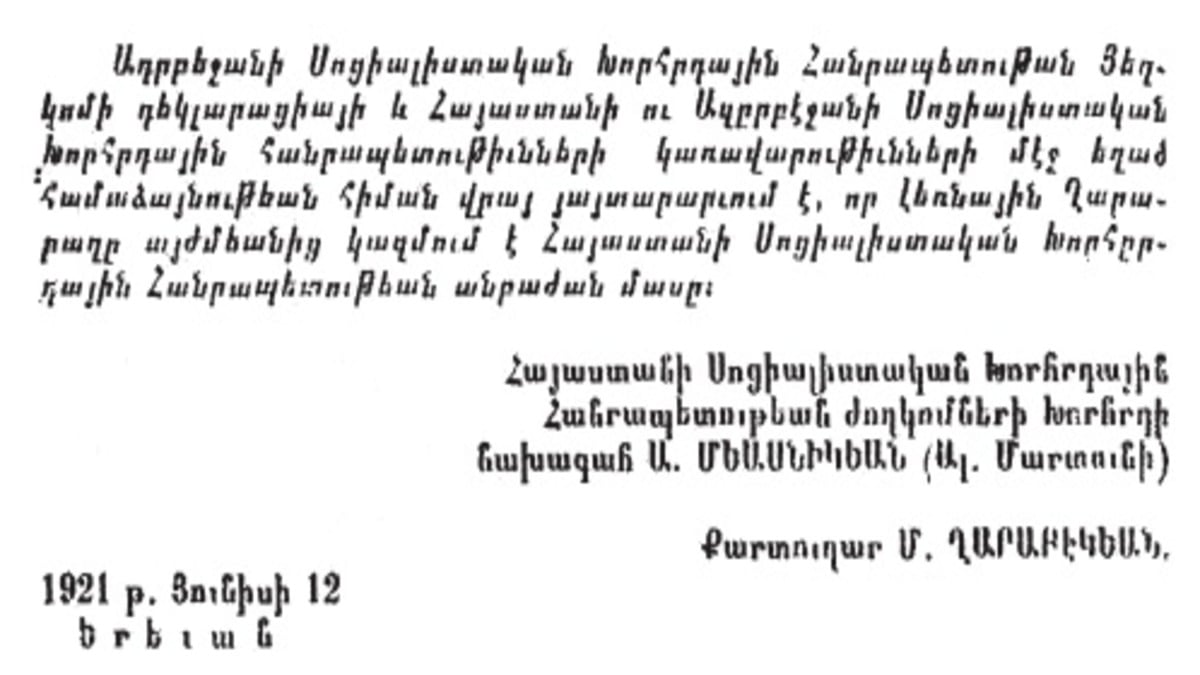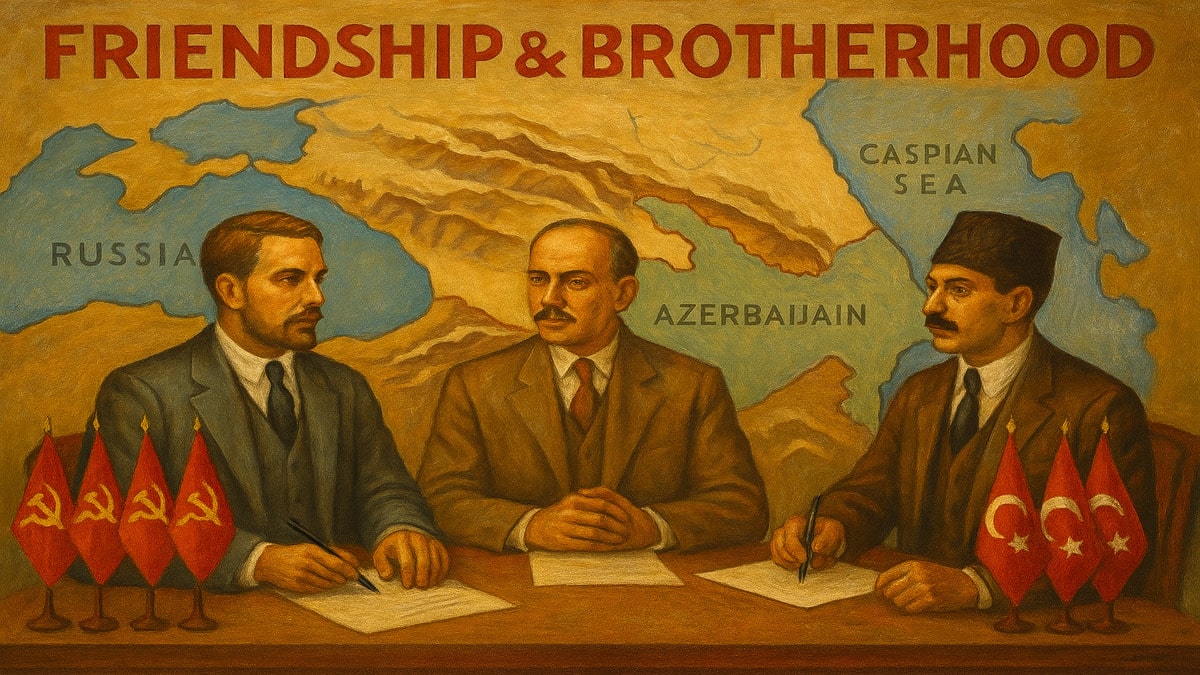
Minutes of the meeting of the heads of delegations of the Five Great Powers—United States, British Empire, France, Italy, and Japan—held in Paris on November 14, 1919.
Mr. Polk explained that Colonel Gaskell, the Inter-Allied High Commissioner for Armenia, would be leaving Paris that night, and that in his view, it would be useful for the Colonel to briefly inform the Council about the situation in Armenia before his departure.
Colonel Gaskell informed the Council that the three republics—Georgia, Armenia, and Azerbaijan—were in conflict with one another on nearly every issue. Georgia and Azerbaijan, perhaps, maintained slightly better relations, as evidenced by a kind of defensive alliance formed between them as a safeguard against a possible southern advance by General Denikin’s army. Armenia had refused to join this alliance. The political and economic conditions in each of the three countries were so dire that they defied description.
He emphasized that these three states had been created arbitrarily, and their borders had likewise been defined without due consideration. The only railway line connecting the Black Sea to Persia crosses all three republics, and under current circumstances, none of them controls it, which effectively paralyzes all movement.
Beyond the hostility that defines relations among these states, other economic difficulties arising from the arbitrary delineation of borders include, for example, the fact that all railway repair workshops are located in Georgia, while the fuel required for the operation of the railway system comes from Baku in Azerbaijan.
Furthermore, relations among the three republics are marked by the existence of various disputed territories and neutral zones, which had been designated by the British, who lacked the authority to alter them. Any attempt to change these arrangements would provoke such acute disputes that no modification was possible until all three republics were united under a single administration.
The Supreme Council had tasked him with representing the Council in Armenia, but he was unable to carry out the necessary work effectively while Georgia and Azerbaijan remained outside his jurisdiction. Moreover, this exclusion created an abnormal situation: thousands of Azerbaijani residents were receiving humanitarian aid in Baku and elsewhere, and the same was true for many Georgians in Tiflis and other locations. Although these impoverished people were entirely dependent on the aid they received, the Relief Administration exercised no control over the actions of the local authorities.
If all these republics were placed under a single administration, the aforementioned neutral zones could be eliminated and provisional borders temporarily established. Such an arrangement would prevent the current situation, in which a significant number of Armenians find themselves within the political boundaries of Georgia.
The Georgians refuse to feed them because they are Armenians; conversely, Armenia refuses to provide any assistance, since these individuals reside within Georgian territory. There is no food available anywhere, and all three republics are essentially surviving on the remnants left behind after the collapse of Russia.
Documents on British Foreign Policy, 1919-1939, First series, Vol. II London, H.M.S.O. 1948, pp. 321-322.
REBUTTAL BY THE DEPUTY HIGH COMMISSIONER OF THE ALLIED POWERS, COLONEL REY, TO THE CLAIM OF THE AZERBAIJANI PREMIER THAT THE APPOINTMENT OF SULTANOV AS TEMPORARY GOVERNOR CONSTITUTES INTERNATIONAL RECOGNITION OF KARABAKH AS PART OF AZERBAIJAN From the minutes of the meeting held at the Office of the Allied High Commissioner, November 20, 1919 Present: Mr. Ussubbekov – Prime Minister of Azerbaijan, Mr. Khatisyan – Prime Minister of Armenia, Colonel Rey – Deputy High Commissioner of the Allied Powers <…>
Mr. Ussubbekov: To my knowledge, the British decision regarding Karabakh and Zangezur was expressed through the appointment of Dr. Sultanov as Governor-General of the region. This may serve as evidence that the British recognized Azerbaijani authority in the area. I must point out that, in fact, Zangezur and Karabakh are two separate regions, although Zangezur is considered one of the three districts of Karabakh.
The complications arose due to the Armenian government sending agitators and officers into the region, which led to unrest. I insist that the districts of Karabakh and Zangezur are part of Azerbaijan.
Colonel Rey: I have information indicating that the British appointed Dr. Sultanov only temporarily, during the period of evacuation of Germans and Turks. He was later recalled by the British. He left for Baku and remained there briefly. He then returned to Shusha, but without authorization from the British. The British were preparing to send their troops to the region when it was revealed that Italian forces were expected to arrive. The Italians were supposed to occupy Shusha and administer the area. However, they did not come; the British again prepared to intervene, but received orders for a general withdrawal to Batum. Dr. Sultanov remains in the area, but without any mandate from the British.
Mr. Ussubbekov: I am unaware of these developments. <…> NAA, f. 200, op. 1, d. 50 II, pp. 309–313. (Emphasis added – Yu.B.)
COMMUNICATION FROM THE ALLIED HIGH COMMISSIONER IN ARMENIA, COLONEL GASKELL (USA), TO THE HEADS OF DELEGATIONS OF THE FIVE GREAT POWERS REGARDING THE AGREEMENT BETWEEN THE PRIME MINISTERS OF ARMENIA AND AZERBAIJAN TO CONVENE AN INTERNATIONAL CONFERENCE FOR THE RESOLUTION OF TERRITORIAL DISPUTES December 18, 1919 – Minutes of the meeting of the heads of delegations of the United States, British Empire, France, Italy, and Japan held in Paris <…> Appendix C to Protocol No. 42 Telegram received from Colonel Gaskell December 1, 1919
Prime Ministers Khatisyan (Armenia) and Ussubbekov (Azerbaijan) have signed an agreement.
The agreement stipulates:
- Both governments commit to cease current military hostilities and refrain from further use of armed force.
- They agree to open roads in Zangezur for peaceful transportation.
- All disputes, including border issues, shall be resolved through peaceful negotiation or, failing that, submitted to a neutral party acting as arbitrator—this party to be the High Commissioner.
- An international conference shall be convened to discuss all contentious issues; delegates shall be granted full authority to resolve them through agreement or arbitration.
- The agreement enters into force on the day of its signing.
In light of these developments, I believe peace may be preserved in the Caucasus if the threat of military action by the Volunteer Army [under General Denikin] against Transcaucasia is removed.
Denikin has withdrawn his mission from both Georgia and Azerbaijan. The possibility of his invasion of Azerbaijan via Dagestan has effectively compelled Azerbaijan to seek assistance from Turkey. I recommend, if deemed appropriate after considering the matter from other perspectives, that the Peace Conference define the limits of Denikin’s operations in the Caucasus—at least until a final resolution of the Caucasian question is reached. <…> Gaskell Documents on British Foreign Policy, 1919–1939, First Series, Vol. II, London, H.M.S.O., 1948, pp. 559, 569–570. (Emphasis added – Yu.B.)
THE ALLIES’ DE FACTO RECOGNITION OF GEORGIA AND AZERBAIJAN MUST NOT PREJUDGE THE FUTURE BORDERS OF ARMENIA Minutes of the meeting of the Foreign Ministers of the Five Great Powers—United States, British Empire, France, Italy, and Japan—held in Paris on January 10, 1920
<…>
Lord Curzon proposed that the following considerations be submitted to the heads of state:
There are three states in the Caucasus: Georgia, Azerbaijan, and Armenia. The fate of Armenia should be determined by the Peace Conference once it has resolved the Turkish question. That leaves Georgia and Azerbaijan, whose independence over the past eighteen months has been highly precarious. They have requested support from the Allies, and de facto recognition of their governments would amount to granting such support.
Berthelot stated that he had already discussed this matter with Lord Curzon in London. He had reported the content of that conversation to Mr. Clemenceau, and to his knowledge, Clemenceau was prepared to agree to de facto recognition on the condition that such recognition of Georgia and Azerbaijan would in no way prejudice the future borders of Armenia.
Decision: That the Principal Allied and Associated Powers shall jointly recognize the governments of Georgia and Azerbaijan as de facto governments.
Documents on British Foreign Policy, 1919–1939, First Series, Vol. II, London, H.M.S.O., 1948, p. 797 (Emphasis added – Yu.B.)
No. 594 – TELEGRAM FROM LORD CURZON CONFIRMING THAT DE FACTO RECOGNITION OF GEORGIA AND AZERBAIJAN DOES NOT PREJUDGE THEIR BORDERS Paris, January 10, 1920
My telegram today:
The de facto recognition of the independence of the Georgian and Azerbaijani governments is certainly not connected to any decision regarding their present or future borders and must not be considered as prejudging this issue in any way whatsoever.
—Lord Curzon Earl of Derby (Paris) to Lord Hardinge (received January 12) No. 24 by telegraph [169629/1015/58] Documents on British Foreign Policy, 1919–1939, First Series, Vol. III, London, H.M.S.O., 1949, p. 752
Note: This telegram, signed by Lord Curzon, was sent to the British Foreign Office by the Earl of Derby, a member of the British delegation to the Peace Conference in Paris, during Lord Curzon’s brief absence from the city.
No. 595 – NOTE FROM FRENCH FOREIGN MINISTRY SECRETARY GENERAL BERTHELOT TO LORD CURZON REGARDING THE TERRITORY OF THE REPUBLIC OF ARMENIA January 11, 1920
<…> (c) Armenia
Armenia shall be established as a fully independent republic under the high protection of the League of Nations.
I. The territory of the Republic of Armenia shall include:
- The existing territory of the Erivan Armenian Republic, including the districts of Borchali, Upper Pambak, and Zangezur, which are currently claimed by Georgia and Azerbaijan;
- A portion of the Turkish Empire: the eastern part of the vilayet of Erzerum, including the city and district of Erzerum, the plain of Mush, the district of Bitlis, and the region of Lake Van up to the Persian border.
Armenia’s borders with the republics of Georgia and Azerbaijan, with Turkey, the French zone, and Kurdistan shall be determined on the ground by an Inter-Allied Commission.
Documents on British Foreign Policy, 1919–1939, First Series, Vol. IV, London, 1952, p. 1024
DECISION OF THE PRIME MINISTERS AND FOREIGN MINISTERS OF THE ALLIED POWERS ON THE RECOGNITION OF ARMENIA WITHOUT PREJUDICE TO THE ISSUE OF DISPUTED TERRITORIES January 19, 1920
Resolved:
- To recognize the Government of the Armenian State as a de facto government, on the condition that such recognition shall in no way prejudge the question of the future borders of this state. <…> Documents on British Foreign Policy, 1919–1939. First Series. Vol. II. London, 1948, pp. 914–925.
No. 598 – TELEGRAM FROM LORD HARDING TO THE HIGH COMMISSIONER IN THE CAUCASUS, WARDROP, REGARDING THE RECOGNITION OF ARMENIA WITH THE CONDITION THAT IT DOES NOT PREJUDGE THE FINAL SETTLEMENT OF ITS BORDERS No. 42 by telegraph [172323/512/58] Foreign Office, January 21, 1920
The Supreme Council in Paris has decided that the Government of Armenia should be recognized as a de facto government, with the explicit condition that such recognition shall in no way prejudge the final settlement of its borders. It is understood that this decision applies to the currently existing Armenian state with its capital in Erivan and does not extend to Turkish Armenia.
You are to immediately inform the Armenian Government of this decision.
Please also notify Constantinople, Tehran, and Denmiss. Documents on British Foreign Policy, 1919–1939. First Series. Vol. III. London, H.M.S.O., 1949, p. 768. (Emphasis added – Yu.B.)
No. 599 – TELEGRAM FROM ACTING U.S. SECRETARY OF STATE POLK TO AMBASSADOR WALLACE IN FRANCE REGARDING AGREEMENT WITH THE ALLIED DECISION TO RECOGNIZE ARMENIA DE FACTO WITHOUT PREJUDGING ITS BORDERS January 24, 1920 Mission 188. In response to your telegram No. 186 of January 19, 19:00
With regard to Armenia, the United States Government agrees with the decision adopted by the Council to recognize the Government of the Armenian State as a de facto government, provided that such recognition shall in no way prejudge the question of its future borders.
The Secretary of State will inform the Armenian representative in Washington accordingly. Papers Relating to the Foreign Relations of the United States, 1920. Vol. III. Washington, 1936, pp. 775–776.
Yuri Barsegov “Nagorno-Karabakh in International Law and Global Politics”
Artatsolum
Read Also:
- Ancient and Medieval Sources on Artsakh (Karabakh) as Part of Armenia’s State Territory
- Message from Gandzasar Catholicos Esayi to Peter I August 10, 1716
- Memorandum Issued to Ivan Karapet Along with the Imperial Letter to the Armenian People Regarding Russia’s Readiness to Take the Armenians of Karabakh Under Its Protection June 3, 1723
- Decree of Peter I to the Armenian People Regarding Russia’s Willingness to Offer Protection to the Armenians of Karabakh
- On Armenian Hopes for Russian Assistance
- Report of Minas Vardapet to Peter I
- Contents of the Secret Letters from the Armenian Assembly and the Armenian Army of Karabakh to the Russian Emperor and Chancellor August 1724
- Contents of the Secret Letters from the Armenian Assembly and the Armenian Army of Karabakh to the Russian Emperor and Chancellor August 1724
- State Charter of Peter I On the Acceptance of the Armenian People Under the Protection of the Russian State and Their Resettlement from Karabakh to Newly Acquired Persian Provinces November 10, 1724
- Letters from the Catholicos and the Meliks of Karabakh
- Charter of Catherine I Addressed to the Armenian Assembly
- Message General Mkhitar—to the Russian Government
- The Armenian Assembly’s Request for Military Assistance June 19, 1727
- Result from Russia’s failure to fulfill its promises of assistance to the Armenians March 1736
- On the Issuance of the Decree Appointing Panah Khan
- Letter from General Potemkin to Prince Argutinsky with questions about the liberation of Armenia
- Appeal of Gandzasar Catholicos Hovhannes to Catherine II
- Letter from Melik Apov Iosifov to Provide Assistance to Russian Military Forces for the Liberation of Enslaved Karabakh
- Report of Prince G. Potemkin to Catherine II
- Request of General P. Potemkin to Prince G. Potemkin
- Letter from Archbishop Joseph Argutinsky to General P. Potemkin
- Memorandum to Catherine II on the Project for the Restoration of the Armenian Kingdom
- Decree of Paul I to General Count I. Gudovich
- Letter from Archbishop Joseph Argutinsky
- Report by State Councillor P. Kovalesky
- The Khan’s Vizier, Mirza Jamal Javanshir Karabakhsky
- From the Report of General Marquis Palluci to Alexander I
- The Gulistan Treaty – An Interstate Act of Iran’s Cession of the Karabakh Territory to Russia
- Report of General A. Yermolov to Alexander I Requesting the Waiver of Tax Arrears for the Karabakh Khanate
- LETTER FROM GENERAL A. YERMOLOV TO MEHTI-KULI KHAN
- Directive from General A. Yermolov to General I. Velyaminov
- Letter of Metropolitan Sarkis Hasan-Jalalyan To General A. Yermolov
- Letter from General I. Paskevich
- TREATY CONCLUDED BETWEEN RUSSIA AND PERSIA AT TURKMENCHAY
- Russian Military Historian V. Potto on the Essence of the Treaty of Turkmenchay
- Order of General I. Paskevich to Colonel L. Lazarev
- STATEMENT ON THE DIFFERING ATTITUDES OF ARMENIANS AND TATARS TOWARD THE ANNEXATION OF KARABAKH TO RUSSIA
- REPORT By the Acting Uezd Chief of the Dzhevanshir Uezd, D. Baranovsky
- From the Memoirs of a Member of the Russian National Council in Baku (1918–1919)
- “TREATY OF PEACE AND FRIENDSHIP” Between the Ottoman Empire and the Republic of Armenia
- Letter from A. Mikaelyan, Representative of the Karabakh and Zangezur Fellowship
- Note of Protest from the Ministry of Foreign Affairs of the Republic of Armenia
- Appeal of the Karabakh Armenian National Council To the Commander of Allied Forces in Baku
- LETTER FROM THE CHAIRMAN OF THE KARABAKH ARMENIAN NATIONAL COUNCIL
- Turks in Shushi
- Letter of Welcome from the Karabakh Armenian
- LETTER FROM GENERAL BAGRATUNI
- FROM THE MESSAGE OF THE ARMENIAN TELEGRAPH AGENCY
- REPORT FROM THE DIPLOMATIC REPRESENTATIVE OF ARMENIA IN GEORGIA
- Resolution of the Fifth Congress of Armenians of Karabakh
- Report by Prime Minister Hatisov to the Council of Ministers of Armenia
- FROM THE MEMORANDUM OF THE KARABAKH ARMENIAN NATIONAL COUNCIL
- 🇬🇧 ANNOUNCEMENT OF THE BRITISH MILITARY MISSION IN SHUSHA
- From the Memorandum of the Armenian Representative to the British Military Mission in Shusha
- Report from the Office of the Governor-General of Karabakh
- NOTICE FROM THE REPRESENTATIVE OF THE BRITISH MILITARY MISSION IN SHUSHI
- 🇬🇧 Doubts Expressed by British Delegate Eric Forbes Adam
- LETTER FROM THE ARMENIAN DIPLOMATIC REPRESENTATIVE
- Assessment by the Karabakh Armenian National Council
- “The Caucasian Word” on the Confirmation by a British Command Representative
- Letter from the Acting Governor-General of Karabakh
- OVERVIEW OF THE SITUATION IN THE CAUCASUS
- Proclamation of the Zangezur Armenian National Council
- Telegram from the Prime Minister of Armenia to the British High Commissioner
- MESSAGE TO THE DIPLOMATIC REPRESENTATIVE
- Photographic Evidence of the Annihilation of Shushi’s Thirty-Thousand Strong Armenian Population
- Appeal of the Karabakh Soldiers and Officers of the Armenian Army
- Territorial Dispute Between the Azerbaijan SSR (as part of the RSFSR) and the Republic of Armenia
- Telegram from the Minister of Foreign Affairs of Armenia
- Telegram from G. Ordzhonikidze to V. Lenin, I. Stalin, and G. Chicherin
- LETTER FROM MEMBERS OF THE CAUCASIAN BUREAU OF THE CENTRAL COMMITTEE OF THE RCP(B): A. AVANESOV, R. KATANYAN, AND AYKUNI
- Report of the Karabakh Community Delegation of Tiflis
- From the Report of People’s Commissar for Foreign Affairs of the RSFSR
- Letter from the People’s Commissar for Foreign Affairs of the RSFSR, G. Chicherin, to V. Lenin
- EXCERPT FROM THE MINUTES OF THE MEETING OF THE POLITBURO
- LETTER FROM MEMBERS OF THE CAUCASUS BUREAU OF THE CENTRAL COMMITTEE OF THE RCP(B)
- LETTER FROM MEMBERS OF THE CAUCASUS BUREAU OF THE CENTRAL COMMITTEE OF THE RCP(B) 11TH RED ARMY
- Telegram from the People’s Commissar for Foreign Affairs of the RSFSR, G. Chicherin
- Appeal from the Commander of the Armenian Expeditionary Detachment
- TELEGRAM OF THE PLENIPOTENTIARY REPRESENTATIVE OF THE RSFSRIN ARMENIA B. LEGRAND
- Letter from Armenian Foreign Minister A. Ohandjanian to the Head of the French Military Mission
- Telegram from Member of the Caucasian Bureau of the Central Committee
- Telegram from Member of the Caucasian Bureau of the Central Committee of the RCP(b)
- First Addendum to the Draft Peace Treaty between the RSFSR and the Republic of Armenia
- Telegram via Direct Line from RVS Member of the Caucasian Front V. Trifonov


